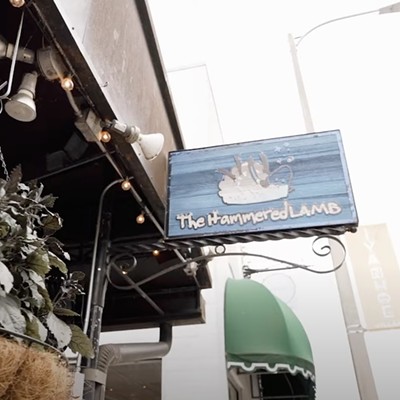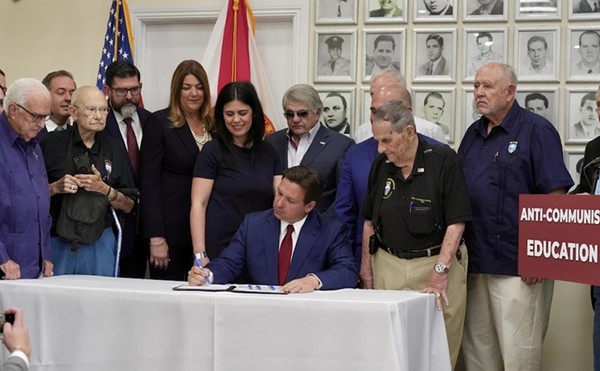Come hell or high water, Mayor Buddy Dyer is determined to build his $1.1 billion public works trifecta. But the public isn't completely sold. Neither are Orange County officials. Doesn't matter. Tourists are going to pay for it all, so we don't need to fret, right?
That's the pitch. But there's an elephant in the room the city isn't talking about: property tax reform. And no matter what they say about tourist taxes, property taxes play a huge part in paying for two of the new venues.
It's a good bet the state Legislature is going to cut the property taxes local governments use to build roads, pay cops and provide services. As of this writing, no one's sure how big the cuts will be. The House wants to scrap property taxes and hike the sales tax. The Senate wants to roll back property tax rates in a less extreme fashion. Gov. Charlie Crist pitched a compromise that slashes $33.5 billion in property taxes over the next five years.
Depending on which version passes, Orange County will lose between $57 million and $235 million a year. The city will suffer too, taking a hit that ranges between $27 million and $32 million, just under 10 percent of its $342 million general-fund budget. What will get slashed? Social services, health care for the poor and mass transit, for starters.
The catch: $160 million of the funding for the Citrus Bowl and performing arts center (but not the arena, as it has a dedicated portion of the tourist tax set aside for construction) will come from the downtown Community Redevelopment Agency, a city-run entity tasked with revitalizing downtown. The CRA exists on downtown property taxes. If property taxes are slashed, it's in trouble.
Founded in November 1983, the CRA is tasked with eliminating blight in downtown Orlando. When a developer wants incentives to build condos, it's the CRA that doles them out. As property values increase within the CRA's boundaries — a byproduct of eliminating blight — the extra tax revenue is diverted to a fund that pays for more development, which in turn leads to more money and more development, and so forth.
But the deeper the tax cuts, the less money the CRA takes in. And if the CRA commits to paying off the Citrus Bowl and performing arts center for the next 30 years, that could be a real problem.
Last year, the CRA took in $17.4 million (of that, the county contributed $7.7 million). Right now, the CRA pays $5.6 million a year on its debt. If it takes out $160 million in bonds, that could mean up to $15 million in debt payments, though the city says this is a "worst-case scenario."
As more downtown skyscrapers come on line, the city anticipates that the CRA will have plenty of money in years to come, which is why city officials are confident the $160 million in bonds won't be too painful.
"If `the cuts` are not severe cuts they can probably get by," says assistant Orange County administrator Eric Gassman.
But if the tax cuts hit hard enough, the city may have to trim its ambitious agenda. Would the city rather renovate the barely used Citrus Bowl or expand the CRA-funded Lymmo bus system? Does it want to revitalize Parramore or build an arts center?
The scenarios are hypothetical, at least until the Legislature figures out what it's going to do.
"I do not believe we will be irresponsible," Rebecca Sutton, the city's chief financial officer, told an April 26 forum on the venues project. Sutton also pledged that the city wouldn't finalize the deal until it knew the impact of the tax cuts.
One version would exempt all CRAs from property tax cuts, which would soften the blow as it created another dilemma: Tax rates inside the CRA zone would stay the same, while those outside it would decrease. That means Parramore residents could pay a higher rate than their neighbors in College Park, says Orange County manager of office and budget Randy Singh. Or it could mean that someone moving into a $300,000 downtown condo would pay more taxes than someone who bought a $300,000 house outside the CRA.
Might that discourage people from moving into an already soft condo market? It might.
"It comes down to how they word it," Singh says. If the CRA is exempted, but officials want to keep CRA tax rates on par with everywhere else, they might have to divert tax dollars that would be spent elsewhere to subsidize the CRA.
City spokeswoman Heather Allebaugh says city officials are "aggressively monitoring" the tax proposals.
Suppose the tax cuts force local governments to cut back services, which city and county officials say will happen. They hire fewer cops. They take longer to fix potholes. They cut medical services for the poor, which further clogs emergency rooms. Homeowners may be pleased with their lower tax bills, but unhappy with the consequences. And they might want those services back, without jacking up taxes.
Solution: the tourist tax. Right now, hotel taxes can only be spent on things that promote tourism (and, thanks to a legislative move meant to help the Magic and Florida Marlins, stadiums that house professional sports teams). If the law was changed, tourist taxes could be spent on other things. Las Vegas uses its hotel taxes on schools and roads.
The hotel industry is powerful, but a change isn't far-fetched, and it isn't that far off. Right now, the Central Florida Police Benevolent Association — the union that represents Orange County Sheriff's deputies — is starting a push to change the tourist tax law. Their theory is that since the sheriff's office spends money patrolling the tourist sector, tourist taxes should pay for some of that protection.
"There is some nexus to it," Singh says. "If Orlando isn't safe, that does have an impact on tourism."
Dyer wants to use $526 million in tourist taxes for these projects, paid out over the next 30 years. Even if the law were changed to allow government to spend tourist tax monies on providing services, Orange County couldn't take advantage of it.
"If that's the case," Singhsays, "`the county` wouldn't have money for anything else."
But the Magic would have a nice new arena.
[email protected]

















